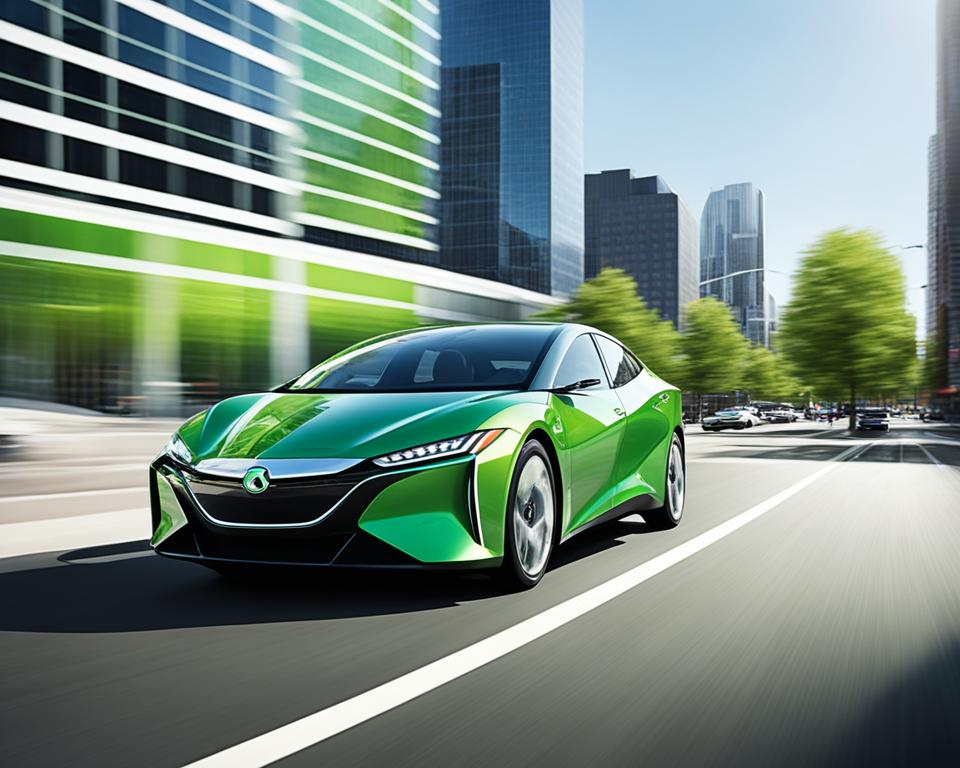As an eco-conscious driver in London, I’ve been increasingly intrigued by the rise in popularity of hybrid cars. These innovative vehicles offer a more environmentally friendly way to get around the city while also providing several advantages over traditional petrol and diesel-powered cars. In this comprehensive guide, I’ll delve into the many benefits of owning a hybrid car in London, from the significant cost savings to the positive impact on the environment.
Hybrid cars are revolutionizing the way we think about transportation, blending the power of a gasoline engine with the efficiency of an electric motor. By harnessing the advantages of both hybrid cars and plug-in hybrids, drivers in London can enjoy fuel efficiency, eco-friendly transportation, and substantial cost savings. From the advanced hybrid batteries and regenerative braking systems to the gasoline-electric powertrain that enables green mobility and low emissions, this guide will provide you with a comprehensive understanding of the hybrid car landscape.
Key Takeaways
- Hybrid cars offer significant cost savings through improved fuel efficiency and lower maintenance costs.
- Hybrid vehicles have a reduced carbon footprint and contribute to improved air quality in London.
- Hybrid technology, including hybrid batteries and regenerative braking, enhances the overall efficiency and performance of these eco-friendly cars.
- Choosing the right hybrid car for your needs, whether for city or highway driving, is essential to maximizing the benefits.
- Incentives and tax benefits are available for hybrid car owners, making them an even more attractive option.
What is a Hybrid Car?
In the world of modern automotive technology, the hybrid car has emerged as a revolutionary solution, blending the power of a traditional petrol engine with the efficiency of an electric motor and a rechargeable battery pack. This innovative combination allows hybrid cars to generate less emissions than their conventional counterparts, making them an increasingly attractive option for eco-conscious drivers.
Defining Hybrid Car Technology
At the heart of a hybrid car’s design is the integration of a petrol engine and an electric motor, which work in tandem to propel the vehicle. The battery pack stores energy, which is then used to power the electric motor, reducing the workload on the petrol engine and improving overall fuel efficiency.
Mild Hybrid vs. Plug-In Hybrid
Within the broad category of hybrid cars, there are two distinct sub-categories: mild hybrids and plug-in hybrids. Mild hybrids rely primarily on the petrol engine for propulsion, with the electric motor providing additional power and support, particularly during acceleration and low-speed driving. In contrast, plug-in hybrids feature a larger battery pack that can be recharged from an external power source, allowing for extended electric-only driving range before the petrol engine is needed.
As the demand for more eco-friendly transportation solutions continues to grow, the hybrid car has emerged as a compelling choice, offering drivers a balance of performance, efficiency, and environmental responsibility.
Benefits of Owning a Hybrid Car in London
For eco-conscious drivers in London, the benefits of owning a hybrid car are numerous. These innovative vehicles not only offer low running costs, but they also play a crucial role in reducing carbon emissions, helping to improve air quality in the city.
Low Running Costs
One of the primary advantages of a hybrid car is its low running costs. By combining the power of a conventional petrol or diesel engine with an electric motor, hybrid cars can achieve significant savings on fuel expenses. This dual-power system allows hybrid owners to travel further on a single tank, making them a more cost-effective option compared to their fossil fuel-driven counterparts.
Reduced Carbon Emissions
Hybrid cars are renowned for their environmental friendliness, as they produce significantly lower carbon emissions than traditional gasoline or diesel vehicles. This is particularly beneficial in London, where air quality remains a pressing concern. By driving a hybrid, you can contribute to the city’s efforts to reduce its carbon footprint and meet emission standards.
Meeting Emission Standards
The UK government has introduced strict emission laws to combat the impact of polluting vehicles on the environment. Hybrid cars, with their eco-friendly technology, are well-positioned to meet the stringent 2021 Euro 6 emissions standards, making them a viable and affordable alternative to conventional petrol or diesel cars. This ensures that hybrid owners can enjoy a green, cost-effective mode of transportation in the heart of London.
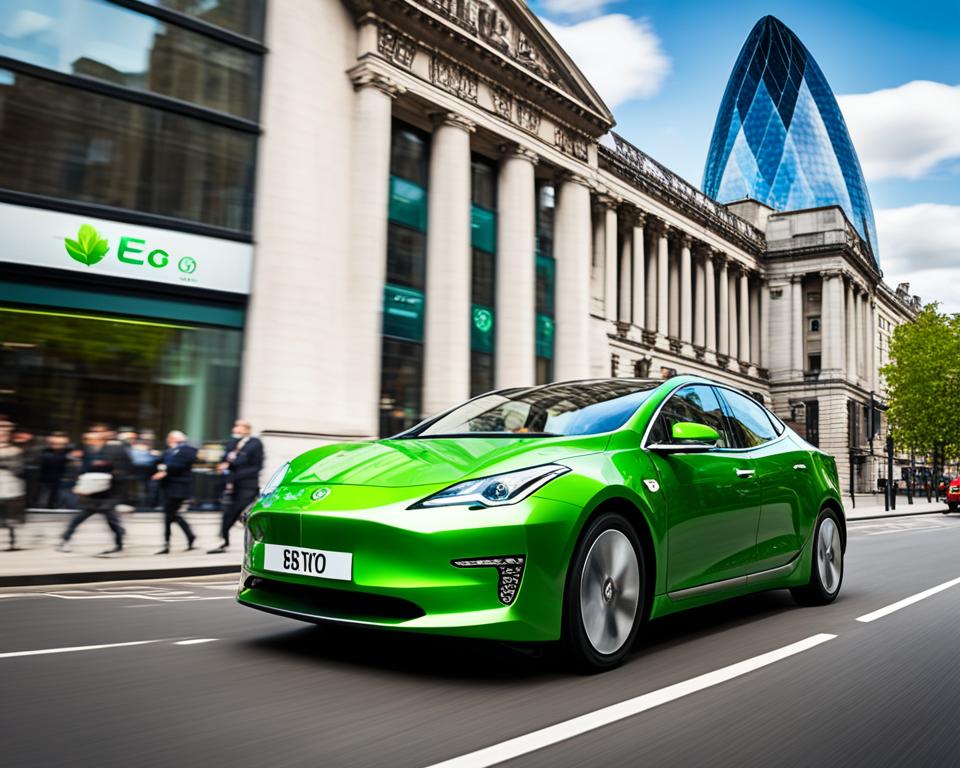
Hybrid Cars and Plug-In Hybrids
When it comes to the world of hybrid vehicles, the distinction between a hybrid car and a plug-in hybrid can sometimes be unclear. However, the key difference lies in the technology and capabilities of these two types of eco-friendly automobiles.
A hybrid car utilizes a combination of a gasoline engine and an electric motor to power the vehicle. The electric motor assists the gasoline engine, improving fuel efficiency and reducing emissions. These vehicles typically recharge their batteries through regenerative braking, where the electric motor acts as a generator to capture energy during deceleration and store it in the battery.
On the other hand, a plug-in hybrid takes this concept a step further. These vehicles have a larger battery pack that can be charged directly from an electrical outlet, allowing for a more extended all-electric range before the gasoline engine kicks in. This provides drivers with the benefits of both electric and hybrid technologies, offering greater flexibility and efficiency.
| Feature | Hybrid Car | Plug-In Hybrid |
|---|---|---|
| Battery Size | Smaller battery pack | Larger battery pack |
| Charging | Recharged through regenerative braking | Recharged from external power source |
| Electric Range | Limited all-electric range | Extended all-electric range |
| Fuel Efficiency | Improved fuel efficiency compared to traditional vehicles | Increased fuel efficiency, especially in urban driving |
The choice between a hybrid car and a plug-in hybrid ultimately depends on an individual’s driving needs, budget, and personal preferences. Both technologies offer significant advantages in terms of fuel efficiency, emissions reduction, and environmental sustainability, making them increasingly popular options for eco-conscious drivers.
Cost Savings from a Hybrid Car
When it comes to owning a vehicle, cost savings are a top priority for many drivers. Fortunately, hybrid cars offer a compelling solution that can significantly reduce your expenses. The integration of an electric motor and a traditional gasoline engine in hybrid cars provides a unique advantage – enhanced fuel efficiency.
Fuel Efficiency Savings
A hybrid car’s ability to seamlessly switch between electric and gas power, coupled with the regenerative braking system that recharges the battery, can result in substantial fuel efficiency gains. This translates to fewer trips to the gas station and more savings on your hybrid car cost savings.
Lower Maintenance Costs
Hybrid cars also boast lower maintenance costs compared to their traditional counterparts. The electric motor and battery pack in a hybrid vehicle require less maintenance, as they have fewer moving parts that can wear down over time. This can lead to significant savings on repair and servicing costs over the life of your hybrid car.
Financing Options at Carverse
If you’re interested in exploring the financing options for a hybrid car, I recommend visiting Carverse. As a leading provider of vehicle financing, Carverse offers a range of flexible and affordable solutions to help you get behind the wheel of your dream hybrid car. Their knowledgeable team can guide you through the process and find the best financing package to suit your budget and needs.
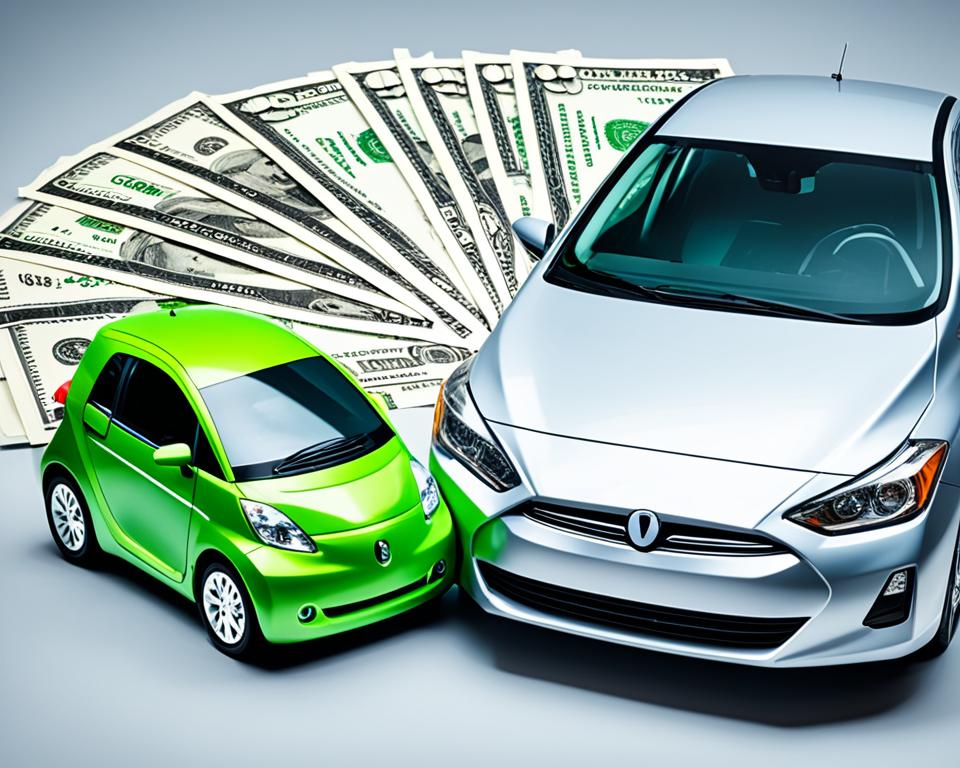
Environmental Impact of Hybrid Cars
As the world becomes increasingly conscious of the need to reduce our environmental impact, the rise of hybrid cars has emerged as a promising solution. According to the first source, hybrid vehicles are typically more eco-friendly than their traditional, gasoline-powered counterparts, particularly when it comes to the reduction of harmful emissions and the lowering of our collective carbon footprint.
Reduced Air Pollution
The World Health Organisation has estimated that air pollution causes around 40,000 deaths each year in the UK. Hybrid cars, with their combination of an electric motor and a petrol or diesel engine, emit significantly lower levels of carbon, nitrogen oxides, and other pollutants compared to standard vehicles. This helps to improve air quality and reduce the impact on public health, making hybrid cars a more environmentally-friendly choice for drivers in urban areas like London.
Lower Carbon Footprint
In addition to lowering air pollution, hybrid cars also contribute to a smaller carbon footprint. The increased efficiency of hybrid powertrains means they use less fuel than traditional vehicles, resulting in lower greenhouse gas emissions and a reduced impact on the environment. This aligns with the global effort to combat climate change and promote more sustainable transportation solutions.
Emission-Free Zones
As governments and local authorities continue to prioritize the reduction of emissions, the rise of emission-free zones in urban areas has become a significant trend. Hybrid cars, with their lower emissions profile, are well-positioned to meet these evolving environmental regulations, allowing drivers to access these zones and contribute to a cleaner, more sustainable future.
Hybrid Cars and Plug-In Hybrids: Key Differences
The key distinction between plug-in hybrids and self-charging (or mild) hybrids lies in their battery size and charging capabilities. Plug-in hybrid vehicles boast a larger battery that can be recharged from an external power source, granting them a more extensive electric-only range. In contrast, self-charging hybrids rely on regenerative braking to recharge their battery, typically offering a more limited electric-only driving range.
Battery Size and Charging
Plug-in hybrid electric vehicles (PHEVs) are equipped with a larger battery pack that can be recharged by plugging into an electrical outlet or charging station. This allows them to operate in all-electric mode for a more substantial distance before the gasoline engine is required to kick in. Self-charging hybrids, on the other hand, have a smaller battery that is primarily recharged through regenerative braking and the internal combustion engine, providing a shorter electric-only range.
Electric Range
The extended electric range of plug-in hybrids is a significant advantage, enabling drivers to complete more daily commutes and short trips solely on battery power, reducing fuel consumption and emissions. Conversely, self-charging hybrids have a more limited electric-only range, relying more heavily on the gasoline engine for propulsion, particularly at higher speeds or for longer journeys.
Fuel Efficiency
Plug-in hybrids boast excellent fuel efficiency when operating in all-electric mode, as they leverage the power of the electric motor and battery. However, their fuel efficiency may decline when the gasoline engine is engaged for longer trips. Self-charging hybrids, on the other hand, maintain a more consistent level of fuel efficiency, as the gasoline engine and electric motor work in harmony to optimize power delivery and reduce fuel consumption.
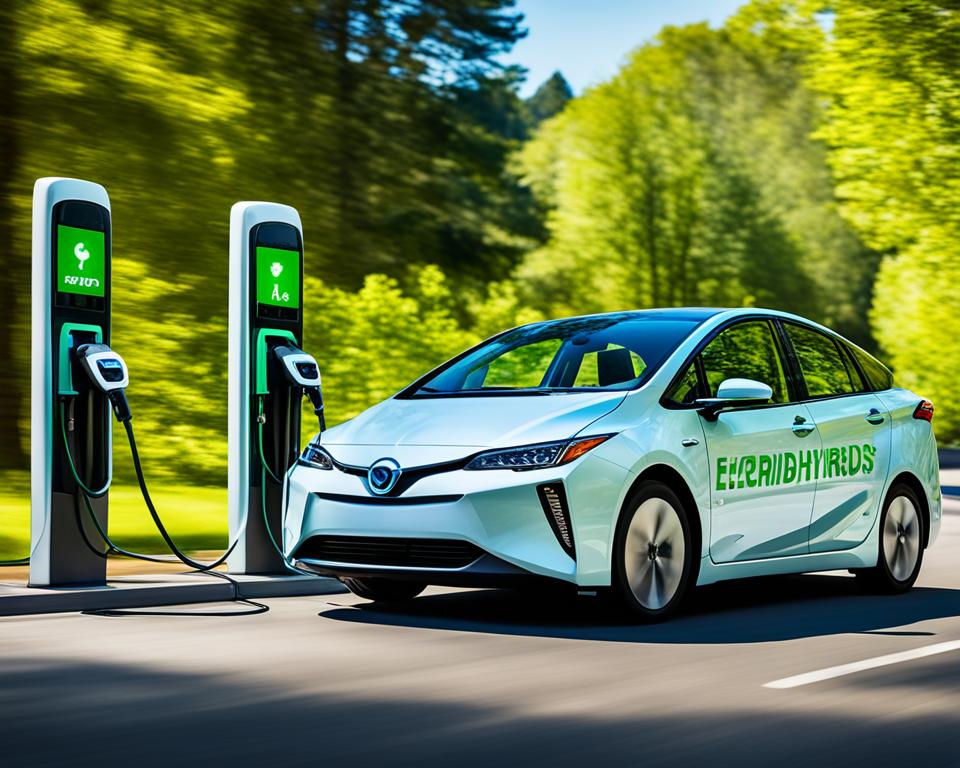
| Feature | Plug-In Hybrids | Self-Charging Hybrids |
|---|---|---|
| Battery Size | Larger battery pack, capable of longer electric-only range | Smaller battery, recharged primarily through regenerative braking |
| Charging | Can be recharged from an external power source | No need for external charging, battery is recharged internally |
| Electric Range | Longer all-electric driving range, typically 20-50 miles | Shorter all-electric range, usually less than 20 miles |
| Fuel Efficiency | Excellent in electric mode, but may decline when using gasoline engine | Consistent fuel efficiency, as gasoline engine and electric motor work in harmony |
Choosing the Right Hybrid Car for Your Needs
When it comes to selecting the perfect hybrid car, it’s essential to consider your unique driving requirements. From city driving to highway commutes, power and performance needs, and budgetary constraints, there are several factors to weigh when choosing a hybrid vehicle that aligns with your lifestyle and preferences.
City vs. Highway Driving
If you primarily navigate through congested urban areas, a hybrid car with a focus on efficient city driving may be the ideal choice. These models often excel at stop-and-go traffic, leveraging their electric motors to reduce fuel consumption and emissions. Conversely, if you frequently embark on lengthy highway journeys, a hybrid with a balance of power and efficiency may be more suitable to handle the demands of high-speed travel.
Power and Performance Requirements
Hybrid cars come in a wide range of performance capabilities, from compact commuters to spacious SUVs. Consider your power and acceleration needs – whether you require a peppy, responsive drive or prioritize fuel economy over raw power. Striking the right balance between power and performance will ensure your hybrid car delivers the driving experience you desire.
Budget Considerations
Hybrid cars can offer significant long-term cost savings, but the initial purchase price may be higher than their conventional counterparts. Carefully evaluate your budget and financing options, as retailers like Carverse can provide insight into the most suitable hybrid models that align with your financial goals.
By carefully weighing these factors, you can confidently choose a hybrid car that checks all the boxes – from city driving and highway performance to your overall budget and needs. Explore the diverse range of hybrid options available to find the perfect fit for your lifestyle and driving preferences.
Considerations for Hybrid Car Ownership
As the popularity of hybrid cars continues to grow, there are several important factors to consider for prospective owners. From setting up a convenient home charging station to understanding the potential maintenance and repair costs, as well as taking advantage of available tax incentives and rebates, these considerations can help ensure a seamless hybrid car ownership experience.
Home Charging Setup
For those opting for a plug-in hybrid electric vehicle (PHEV), having a reliable home charging setup is highly recommended. With over 38,000 public charging points across the UK and new charge points being added regularly, charging a PHEV is easier than ever. However, a dedicated home charging station can provide the quickest and most convenient option, allowing you to charge your vehicle overnight and start each day with a full battery.
Maintenance and Repair Costs
Compared to traditional gasoline-powered vehicles, hybrid cars often have lower maintenance and repair costs. The integration of an electric motor and battery pack can reduce wear and tear on certain components, such as the brakes, due to the regenerative braking system. Additionally, the hybrid powertrain requires less frequent maintenance, helping to keep ownership costs down over the long term.
Tax Incentives and Rebates
To encourage the adoption of more environmentally-friendly vehicles, the UK government offers a range of tax incentives and rebates for hybrid car owners. This includes the Plug-In Car Grant, which provides a discount of up to £1,500 on the purchase price of eligible plug-in hybrids. Additionally, hybrid cars may be exempt from certain road taxes or congestion charges, further offsetting the overall cost of ownership.
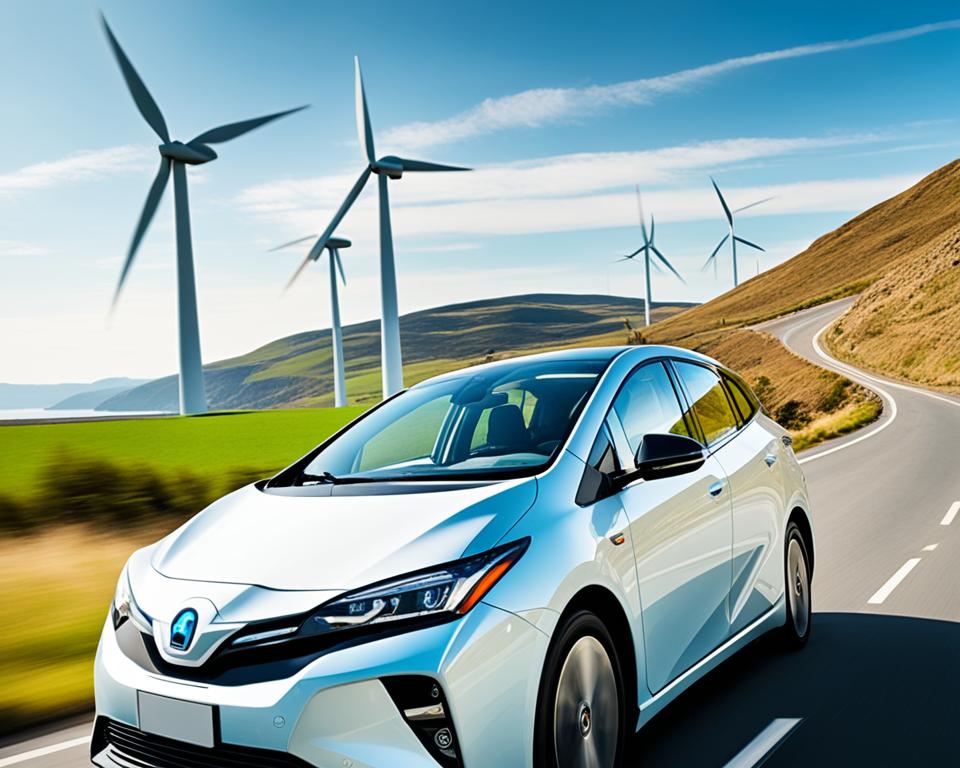
Plug-In Hybrid Advantages
If you’re seeking an efficient, low-emission car but aren’t quite ready to transition to a fully electric vehicle, a plug-in hybrid (PHEV) may be the perfect solution. According to the second source, plug-in hybrids offer several distinct advantages that make them an increasingly attractive option for eco-conscious drivers.
Longer Electric Range
One of the primary benefits of a plug-in hybrid is its extended electric range. Compared to traditional self-charging hybrids, PHEVs have a larger battery pack that can be charged from an external power source, allowing for a greater number of all-electric miles before the gasoline engine kicks in. This plug-in hybrid advantages can significantly reduce your overall fuel consumption and emissions, making it an excellent choice for urban commuting or shorter trips.
Lower Running Costs
Plug-in hybrids also offer lower running costs compared to conventional gas-powered vehicles. By relying more on electricity for daily driving, you can take advantage of the typically lower cost of charging versus filling up at the pump. This can translate to significant savings on running costs over the long term, making PHEVs a more budget-friendly option for many drivers.
Tax Benefits and Incentives
In addition to the fuel and maintenance savings, plug-in hybrids may also qualify for various tax benefits and incentives depending on your location. Many governments, including the UK, offer financial incentives, such as tax credits or rebates, to encourage the adoption of more energy-efficient and environmentally-friendly vehicles like PHEVs. These tax benefits and incentives can further reduce the overall cost of ownership, making plug-in hybrids an even more attractive choice for eco-conscious consumers.
Self-Charging Hybrid Advantages
As I delve into the world of hybrid cars, I’ve discovered that self-charging hybrids, also known as full or mild hybrids, offer a unique set of advantages. Unlike their plug-in counterparts, self-charging hybrids eliminate the need for a dedicated charging setup, making them a more convenient option for many drivers.
No Need for Charging
One of the primary benefits of self-charging hybrids is the absence of the requirement to plug in and charge the vehicle. These models rely on regenerative braking and the internal combustion engine to recharge the battery, negating the need for external charging infrastructure. This simplifies the ownership experience and makes self-charging hybrids an appealing choice for those who may not have easy access to charging stations.
Efficient for City Driving
Self-charging hybrids are particularly well-suited for city driving, where their efficient electric-assisted performance shines. The seamless integration of the electric motor and the gasoline engine allows for improved fuel economy and reduced emissions, making them a more environmentally-friendly option for urban commuters.
Lower Emissions than Gas-Powered Cars
Compared to traditional gasoline-powered vehicles, self-charging hybrids boast lower emissions. The combination of the electric motor and the internal combustion engine results in a significantly smaller carbon footprint, making these cars a more sustainable choice for eco-conscious drivers in the United Kingdom.
FAQ
What is the difference between a hybrid car and a plug-in hybrid?
What are the benefits of owning a hybrid car in London?
How do plug-in hybrids and self-charging hybrids differ in terms of charging and range?
What are the cost savings associated with owning a hybrid car?
How do hybrid cars help reduce emissions and improve air quality?
What factors should I consider when choosing a hybrid car for my needs?
What are the key considerations for hybrid car ownership?
Source Links
- https://www.carverse.co.uk/newsandadvice/exploring-the-benefits-of-hybrid-cars-in-london-a-comprehensive-guide/
- https://www.dsautomobiles.co.uk/ds-experience/electric-hybrid/guides/plug-in-hybrid-vs-self-charging-hybrid.html
- https://www.linkedin.com/pulse/phev-cost-savings-comparing-plug-in-hybrid-electric-data-zeuthen
